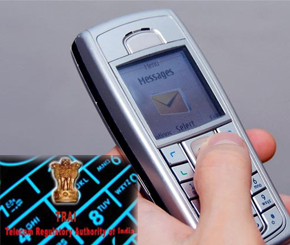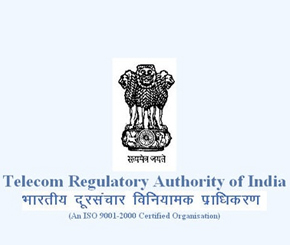This coming Dussehra, be watchful while drawing the list to wish your
friends through SMSes. Given the fact that, the Telecom Authority of
India (TRAI) from September 27th is limiting the number of texts per day
to 100, are halcyon days of text messaging over?

Inexplicably, this latest rules is government's line of attack against spontaneous messages that broke out in recent years. TRAI asked the mobile operators to limit the number of SMSs to 100 per day for each subscriber. This new rule is expected to bang the SMS volume and consequently profit the operators, who can swell the prices to compensate their losses.
Though there are numerous mobile phone users who send more than 100 messages a day, the regulator and government officials are reluctant to buy this. They claim this is the best way to deal with annoying calls that the government and TRAI have been powerless to tackle for years.
Operators are adamant that there will be no major impact on the SMS tariffs due to the ban, but it will be thorny for them given the tight margins that they operate in, which has in recent past lead to increase in prices of call rates and SMSes alike.
"The volumes will definitely take a hit, however it will impact the new players more than the older ones. As SMS revenue are a very small part of the revenue for larger well established players. But then new operators' ability to survive with a price hike is very limited and therefore even they will wait for the larger operators to hike prices," said an executive of a leading telecom operator.

Rajan S Mathew, Director General, Cellular Operator Association of India does not feel there will be a crash on pricing. He said, "All though volumes will definitely take a hit, the cost implication will be very minimal and will not reach the retail subscribers. In fact we have already communicated to the TRAI that this move is not going to be beneficial for anyone in the eco-system as the unscrupulous elements that send out spam massages will end up buying more connection to continue to send these spasm, and only the end consumer will suffer."
Monitoring 3,000 SMSes a month for postpaid subscribers, adhered to or not will be tough for the telecom operators. "In case of prepaid users, you can monitor it on a day-today basis, but for postpaid customers, you will look at the number at the end of the month," said Rajan.
Previously this month, the telecom regulators had made it mandatory for commercial communications to be sent between 9 am and 9 pm to all subscribers whether registered for the "National Do Not Call Registry" or not. On the other hand, you can choose for the facility which allows you to access information on any of the seven segments-banking and financial products, real estate, education, health, consumer goods, automobiles, communication and entertainment, tourism and leisure. An exception will be made in case of transaction-related messages such as those from banks, insurance companies, railways, airlines or telecom service providers for providing information related to customers or passengers.
There are a few things that need to be measured. On a day to day basis very few consumers will comprehend that there is a limit as most users do not send even 50 messages a day.
The brunt will be felt all through the festivals and special occasions when most people send a lot of SMSes to wish their near and dear ones. And the impact on the operators will also be the highest on these days as the discounted rates are not applicable on these days, bringing in a lot of profit. They will not be proficient enough to make much profit on other days, and will be forced to extract profit by either escalating the SMS rates or making the discount vouchers costlier, or plummeting the number of free SMSes that users get with special vouchers.

Students, who have a preference to texting than calling as it is cheaper; individual professionals, who need to stay on clients' radars; or even a housewife sending out party invites will all be affected by the boundary. However, the law is not relevant to transactional messages, such as the balance updates sent by banks and to telemarketers registered with TRAI. Public interest messages or those about natural calamities and charities are also excused within the 160-character limit.
What can help thwart this hike is the fact that the registered telemarketers are still free to send as many massages as they want, but only to people who have opted for promotional SMSes. And since the volumes here are massive it might be able to soak up the crash from the cutback in retail user generated volumes.
But what impact will this regulation have on volumes? Only time will tell!
Inexplicably, this latest rules is government's line of attack against spontaneous messages that broke out in recent years. TRAI asked the mobile operators to limit the number of SMSs to 100 per day for each subscriber. This new rule is expected to bang the SMS volume and consequently profit the operators, who can swell the prices to compensate their losses.
Though there are numerous mobile phone users who send more than 100 messages a day, the regulator and government officials are reluctant to buy this. They claim this is the best way to deal with annoying calls that the government and TRAI have been powerless to tackle for years.
Operators are adamant that there will be no major impact on the SMS tariffs due to the ban, but it will be thorny for them given the tight margins that they operate in, which has in recent past lead to increase in prices of call rates and SMSes alike.
"The volumes will definitely take a hit, however it will impact the new players more than the older ones. As SMS revenue are a very small part of the revenue for larger well established players. But then new operators' ability to survive with a price hike is very limited and therefore even they will wait for the larger operators to hike prices," said an executive of a leading telecom operator.
Rajan S Mathew, Director General, Cellular Operator Association of India does not feel there will be a crash on pricing. He said, "All though volumes will definitely take a hit, the cost implication will be very minimal and will not reach the retail subscribers. In fact we have already communicated to the TRAI that this move is not going to be beneficial for anyone in the eco-system as the unscrupulous elements that send out spam massages will end up buying more connection to continue to send these spasm, and only the end consumer will suffer."
Monitoring 3,000 SMSes a month for postpaid subscribers, adhered to or not will be tough for the telecom operators. "In case of prepaid users, you can monitor it on a day-today basis, but for postpaid customers, you will look at the number at the end of the month," said Rajan.
Previously this month, the telecom regulators had made it mandatory for commercial communications to be sent between 9 am and 9 pm to all subscribers whether registered for the "National Do Not Call Registry" or not. On the other hand, you can choose for the facility which allows you to access information on any of the seven segments-banking and financial products, real estate, education, health, consumer goods, automobiles, communication and entertainment, tourism and leisure. An exception will be made in case of transaction-related messages such as those from banks, insurance companies, railways, airlines or telecom service providers for providing information related to customers or passengers.
There are a few things that need to be measured. On a day to day basis very few consumers will comprehend that there is a limit as most users do not send even 50 messages a day.
The brunt will be felt all through the festivals and special occasions when most people send a lot of SMSes to wish their near and dear ones. And the impact on the operators will also be the highest on these days as the discounted rates are not applicable on these days, bringing in a lot of profit. They will not be proficient enough to make much profit on other days, and will be forced to extract profit by either escalating the SMS rates or making the discount vouchers costlier, or plummeting the number of free SMSes that users get with special vouchers.
Students, who have a preference to texting than calling as it is cheaper; individual professionals, who need to stay on clients' radars; or even a housewife sending out party invites will all be affected by the boundary. However, the law is not relevant to transactional messages, such as the balance updates sent by banks and to telemarketers registered with TRAI. Public interest messages or those about natural calamities and charities are also excused within the 160-character limit.
What can help thwart this hike is the fact that the registered telemarketers are still free to send as many massages as they want, but only to people who have opted for promotional SMSes. And since the volumes here are massive it might be able to soak up the crash from the cutback in retail user generated volumes.
But what impact will this regulation have on volumes? Only time will tell!














0 comments:
Post a Comment